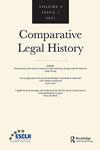History and the law: a love story
IF 0.5
Q2 LAW
引用次数: 0
Abstract
hands of legal historians like them, had a similar, moral and political ambition, namely to bring various particular laws closer to one another for the sake of promoting more harmonious, friendly international relations. The primary objective of the driving forces behind the Paris congress, then, was not primarily scientific but practical in nature. As Saleilles acknowledged in his report on the usefulness of comparative law, a lawyer cannot help but draw practical conclusions from the theoretical insights gained from comparing different legal systems. In this regard, Saleilles rejected forms of comparative law consisting in the mere juxtaposition of foreign legal systems or the classification into legal families. One had to confront the different laws and then adapt inspiring foreign laws to the needs of one’s own legal system, taking into account contextual particularities, including local customs and traditions. Saleilles rebuked the exegetical approach of law, promoting a larger view of the sources of the law instead, which included taking inspiration from foreign laws. Lambert, his pupil and admirer, articulated an interesting distinction between comparative law as a ‘science of law’ (science du droit) and a ‘juridical science’ (science juridique). While the former came close to ethnology and sociology, trying to retrieve the eternal patterns guiding the evolution of law as a social phenomenon, the latter had a practical dimension: it wanted to change the laws and the societies that they are operating in. Its end goal was ‘rapprochement’.历史与法律:一个爱情故事
像他们这样的法律历史学家有着相似的道德和政治抱负,即为了促进更和谐、友好的国际关系,使各种特定的法律更加接近。当时,巴黎大会背后的驱动力的主要目标不是科学的,而是实用的。正如Saleilles在其关于比较法有用性的报告中所承认的那样,律师不得不从比较不同法律制度所获得的理论见解中得出实际结论。在这方面,Saleilles拒绝接受仅仅将外国法律制度并置或划分为法律家族的比较法形式。一个人必须面对不同的法律,然后根据自己法律体系的需要调整鼓舞人心的外国法律,同时考虑到环境的特殊性,包括当地的习俗和传统。Saleilles谴责了法律的训诫方法,转而提倡对法律来源的更大观点,其中包括从外国法律中汲取灵感。兰伯特是他的学生和崇拜者,他阐述了比较法作为“法律科学”(权利科学)和“司法科学”(法律科学)之间的有趣区别。前者接近民族学和社会学,试图找回指导法律作为一种社会现象演变的永恒模式,而后者则具有实践层面:它希望改变法律及其所处的社会。它的最终目标是“和解”。
本文章由计算机程序翻译,如有差异,请以英文原文为准。
求助全文
约1分钟内获得全文
求助全文
来源期刊
CiteScore
1.70
自引率
0.00%
发文量
20
期刊介绍:
Comparative Legal History is an international and comparative review of law and history. Articles will explore both ''internal'' legal history (doctrinal and disciplinary developments in the law) and ''external'' legal history (legal ideas and institutions in wider contexts). Rooted in the complexity of the various Western legal traditions worldwide, the journal will also investigate other laws and customs from around the globe. Comparisons may be either temporal or geographical and both legal and other law-like normative traditions will be considered. Scholarship on comparative and trans-national historiography, including trans-disciplinary approaches, is particularly welcome.

 求助内容:
求助内容: 应助结果提醒方式:
应助结果提醒方式:


